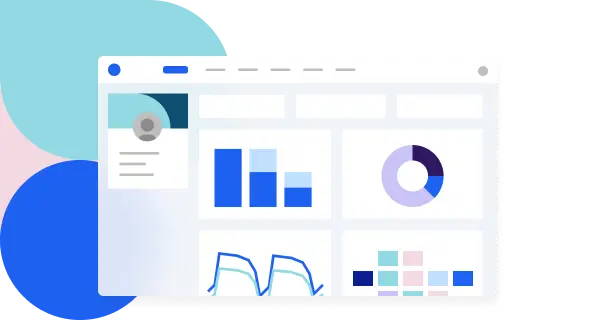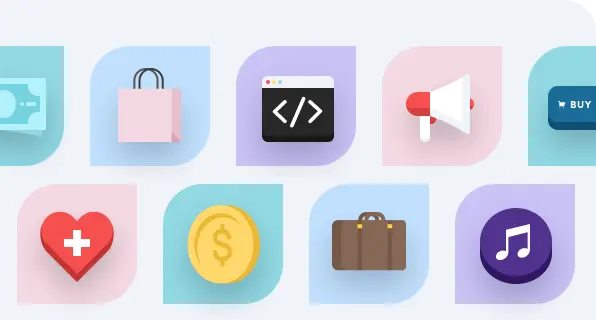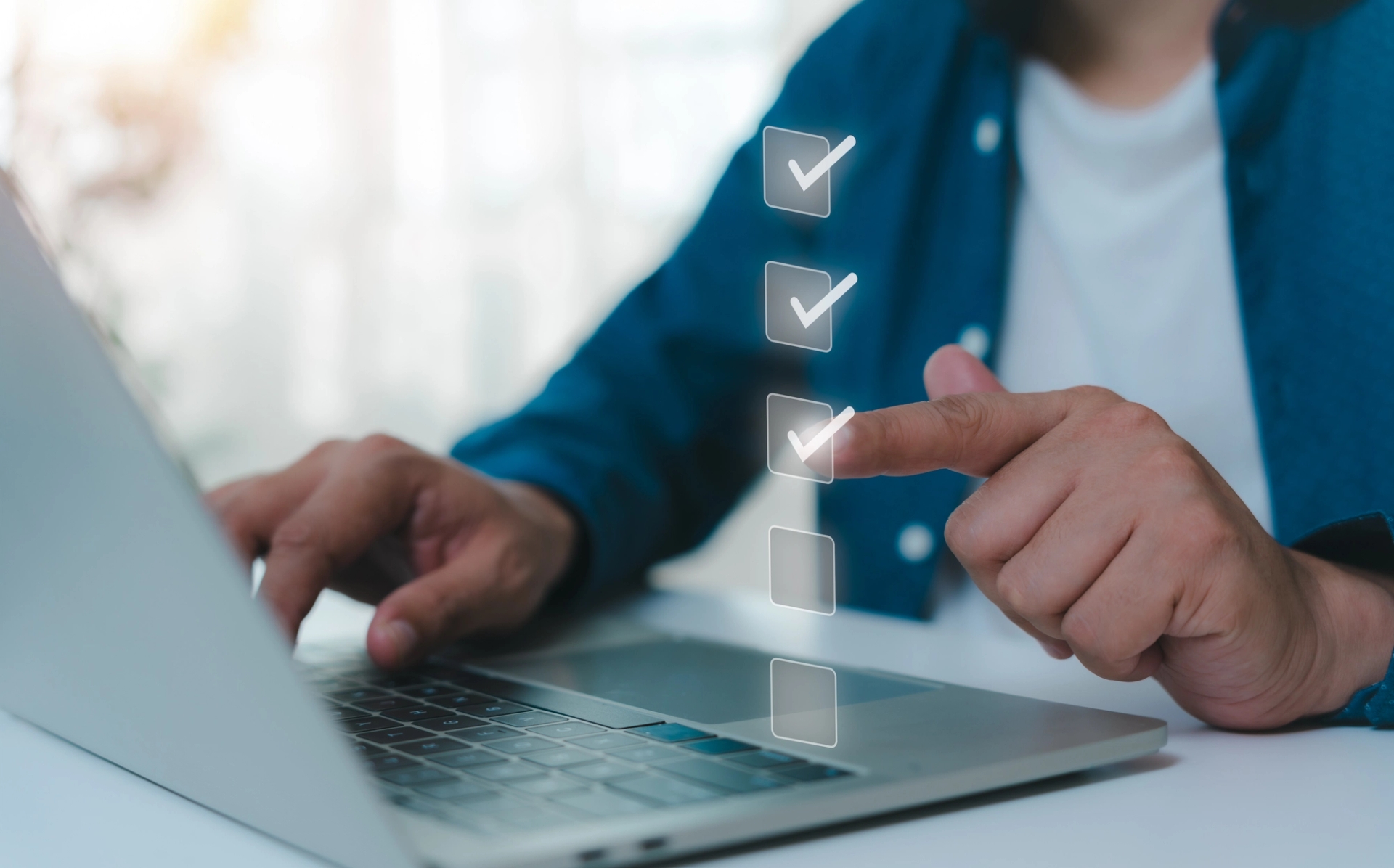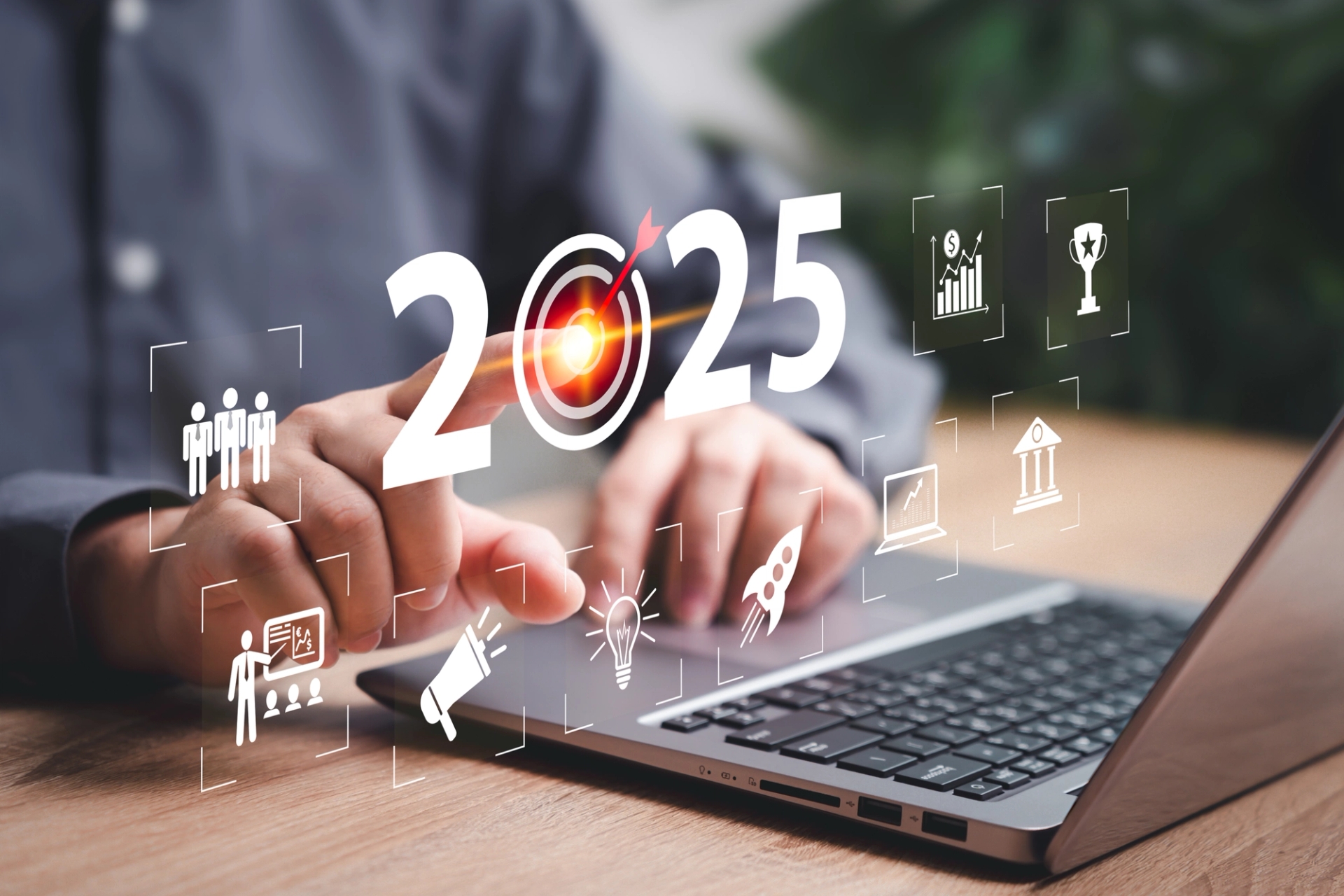The Ultimate Guide to Effective B2B Event Marketing Strategies
Discover effective B2B event marketing strategies that drive engagement and boost ROI. Learn practical tips to elevate your next event—read more now!

Mastering B2B Event Marketing: Proven Tactics for 2025 Success
Looking to excel in B2B event marketing? Effective strategies can boost your brand, build vital business relationships, and generate high-quality leads. This article covers actionable tips and proven tactics to ensure your B2B events drive business success in 2025 and beyond.
Key Takeaways
- B2B event marketing is essential for building relationships, boosting brand visibility, and generating leads through various event types like trade shows, conferences, and webinars.
- A successful event strategy emphasizes clear goals, audience-centric content, and the right format, with 80% of the focus on pre and post-event activities.
- Leveraging technology, creating memorable experiences, and integrating sustainable practices are critical for future B2B events, making them more engaging and responsible.
Understanding the Fundamentals of B2B Event Marketing
B2B event marketing is the cornerstone of building strong business relationships, boosting brand visibility, and generating valuable leads. At its core, B2B event marketing involves deploying strategies and techniques to promote and market events specifically designed for business-to-business interactions. These events are crucial for establishing connections, enhancing brand image, and facilitating lead generation, ultimately driving business growth.
Building trust and facilitating relationship-building among industry professionals is a key aspect of B2B events. These gatherings provide a platform for businesses to engage with their target audience, showcase their offerings, and create meaningful connections that can lead to long-term partnerships. Whether it’s a trade show, conference, or webinar, each type of B2B event serves a unique purpose and contributes to the overall success of the marketing strategy.
Understanding the various types of B2B events and their distinct benefits is essential for creating impactful marketing efforts. From in-person interactions to virtual and hybrid formats, each event type offers different opportunities for audience engagement and business growth. Let’s delve into the specific types of B2B events and explore how they can be leveraged to achieve your marketing objectives.
Types of B2B Events
B2B events come in various formats, each designed to connect businesses and generate leads in unique ways. Here are some common types of B2B events:
- Trade shows, which are known for attracting quality leads and providing businesses with essential visibility to showcase their products and services.
- Conferences, which offer networking opportunities and educational sessions for industry professionals.
- Webinars, which allow businesses to reach a wider audience online and share valuable insights.
- Networking events, which facilitate connections between businesses and potential clients in a more informal setting.
These events offer a platform for other businesses to interact with potential clients through face to face interactions, fostering trust and facilitating immediate feedback for other business owners.
Conferences, on the other hand, are ideal for providing educational content and networking opportunities. They play a critical role in enhancing brand authority within the particular industry by offering attendees valuable insights, strategies, and new opportunities.
Webinars provide a cost-effective way to engage audiences with expert insights and flexible attendance options, making them a popular choice in the virtual event landscape. Networking events focus on building professional relationships through informal interactions, creating an environment conducive to meaningful connections and business growth.
Additionally, formats like roadshows and VIP dinners contribute to brand exposure and help increase brand awareness while also helping to build brand awareness by offering exclusive experiences and personalized interactions.
In today’s digital age, have emerged as a powerful tool in B2B marketing.
Combining the benefits of in-person and virtual events, hybrid formats offer:
- Increased flexibility
- Broader reach
- Catering to diverse audience preferences
- Maximizing engagement
Understanding and leveraging these event types allows businesses to create impactful events that resonate with their target audience and drive successful events, highlighting the event’s impact.
Crafting a Winning B2B Event Marketing Strategy
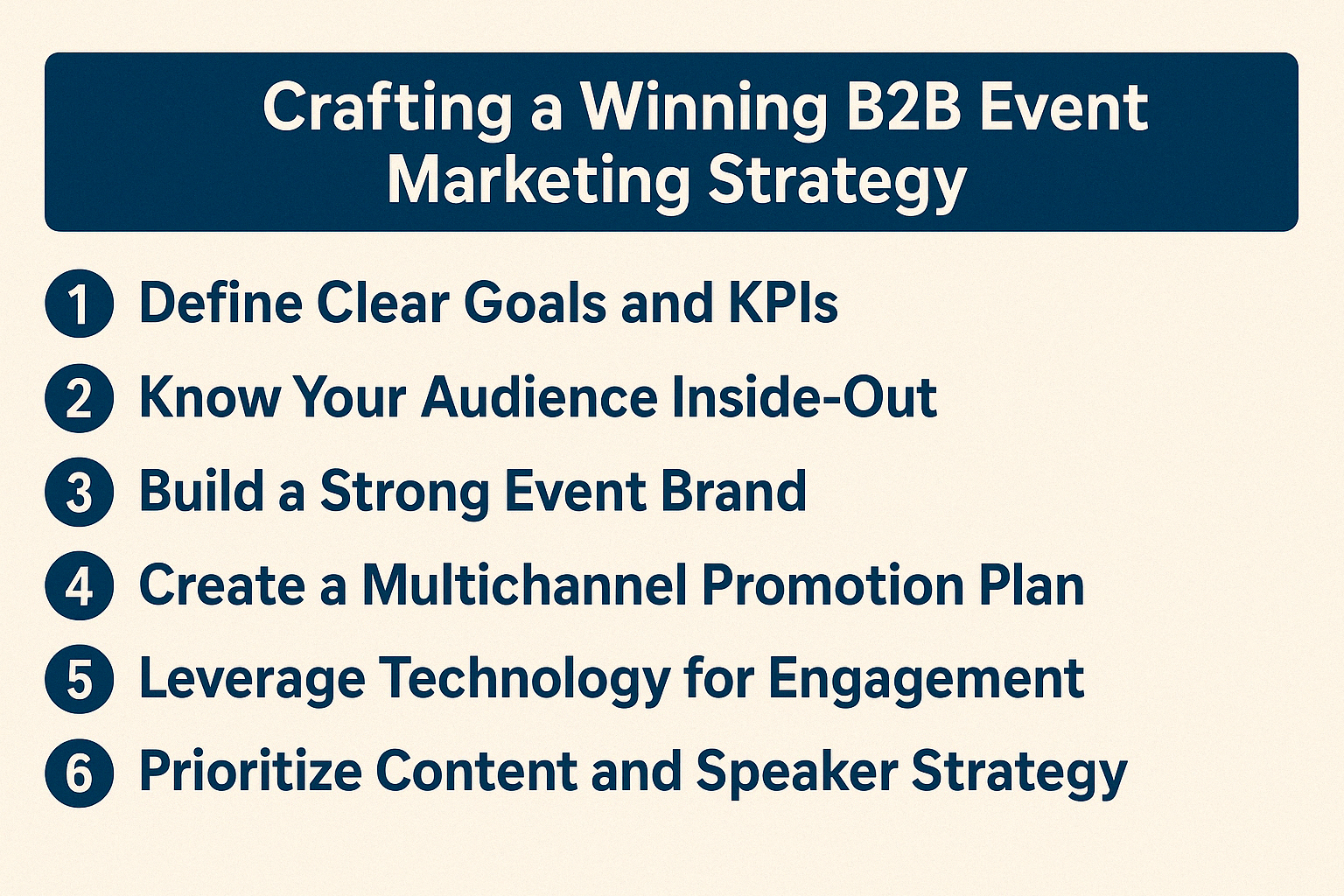
A winning B2B event marketing strategy ensures that your events resonate with your audience and meet business objectives. A clear and well-defined overall marketing strategy helps convert attendees into customers, making your events a worthwhile investment rather than a sunk cost. Approximately 80% of your event strategy should focus on pre-event and post-event activities to maximize time and investment.
A successful B2B event should focus on:
- An audience-centric approach
- Integrated technology
- Valuable content
- Post-event nurturing
Establishing clear event objectives, identifying your target audience, and choosing the right event format are foundational steps in event planning. These elements ensure that your event is not only well-planned but also positioned to achieve measurable outcomes.
Let’s delve into the specifics of setting clear objectives, identifying your target audience, and selecting the appropriate event format to create a robust B2B event marketing strategy.
Setting Clear Objectives
Specific and measurable event goals are crucial for actionable strategies in B2B event marketing. Clear objectives help ensure that the event format and content deliver value and achieve desired outcomes. Common objectives for B2B events include lead generation, audience engagement, and commitment forecasting.
Quantifiable goals, such as acquiring a set number of qualified leads or increasing social media engagement by a certain percentage, provide a clear direction for your marketing efforts. These goals must align with your overall business strategy to ensure that they support broader company objectives.
The first step in planning a successful B2B event is to establish goals. Clear and defined objectives streamline the planning process, enhance the effectiveness of the event, and ensure that every aspect of the event aligns with the intended outcomes.
Identifying Your Target Audience
Identifying the target audience is crucial as it enables the creation of an agenda that resonates with attendees’ interests. Segmenting your audience based on industry, role, and specific needs allows for tailored content that addresses their unique challenges. This audience-centric approach significantly improves engagement by aligning the event theme with the interests of attendees.
Prioritizing outreach to attendees who are actively researching their needs can maximize engagement with relevant prospects. Understanding attendee interests can be further enhanced through pre-event surveys, helping to fine-tune the content and format of the event.
Focusing on the needs and preferences of your target audience creates meaningful and engaging event experiences that drive business growth and foster lasting relationships.
Choosing the Right Event Format
The appropriate event format is crucial in B2B event marketing as it engages the audience and helps achieve goals. Selecting the appropriate format aligns with audience preferences and significantly impacts overall event engagement. The chosen event format should resonate with attendees’ preferences and the planned content.
Different formats, such as in-person, virtual, and hybrid events, offer unique opportunities and challenges. The event format must be capable of achieving the goals you’ve set out. Leveraging technology, such as event management software, can management, ensuring a successful event.
Carefully selecting the right event format ensures impactful events at your next event runs smoothly that resonate with your audience and drive business success.
Enhancing Audience Engagement

Engaging your audience during a B2B event is crucial for increasing satisfaction and ensuring a long-term impact. Understanding attendees’ needs and preferences is vital for boosting audience engagement. Engaging content and interactive sessions help hold attention and maintain interest throughout the event.
A well-structured event schedule keeps the and maintains attendee engagement. Effective methods for audience engagement during events include real-time content and networking opportunities. Hybrid events, which allow for in-person and remote participation, offer advantages like increased attendance rates and audience satisfaction.
sustains relationships and drives customer retention. Let’s explore leveraging technology for interaction and creating memorable experiences to enhance audience engagement further.
Leveraging Technology for Interaction
Effective engagement at B2B events often relies on integrating advanced technology, such as and live polling, to enhance real-time interaction. Shifting to tech-enhanced experiences has become essential for businesses in event formats. The role of an event app in B2B event marketing is to keep attendees engaged and informed through schedules, networking opportunities, and exclusive content.
Live polls and Q&As provide valuable insights into the audience’s interests and foster engagement during B2B events. Incorporating chat options, polls, reactions, and activity challenges can significantly boost audience interaction.
Engaging attendees through notifications and session information from the event app enhances interaction at in-person events. Leveraging technology creates impactful events that resonate with your audience and drive meaningful interactions.
Creating Memorable Experiences
Networking opportunities facilitate relationship-building among attendees, which is essential for B2B marketing. VIP dinners provide an exclusive experience where attendees have the opportunity to network and ask questions. Effective networking can be encouraged by capturing attendees’ interests during registration.
Key components of a successful B2B event agenda include interactive workshops and breakout sessions. Innovative breakout sessions can include intimate dinners or happy hours to foster deeper connections. Creating trendy, taggable moments during sessions can provide social media engagement opportunities.
At trade shows, creating a memorable experience can be achieved through strategies like giveaways and hands-on product demos. Utilizing digital swag such as gift cards and exclusive content can enhance the attendee experience at virtual and hybrid events. Focusing on personalization and client participation creates memorable experiences that resonate with your audience and drive business success.
Maximizing Lead Generation
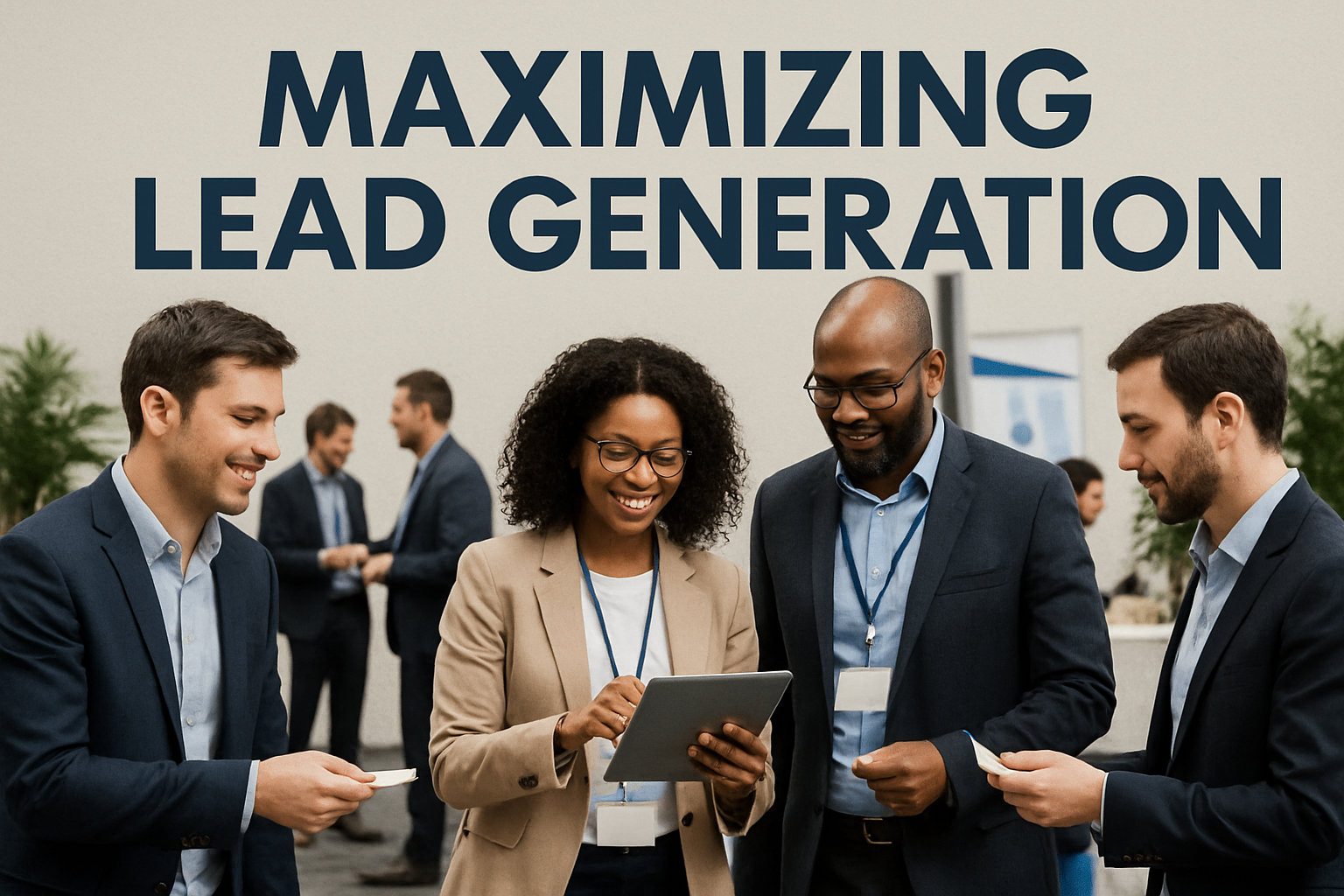
Attending live B2B events helps businesses promote their brand. It also provides opportunities to make valuable connections. Events that are well-planned draw in attendees. These individuals tend to have a genuine interest in the products or services being offered. B2B event marketing accelerates relationships by bringing together decision-makers, which is key for lead generation.
Innovative event ideas create engaging events that produce interest and lasting impressions. Incorporating successful content from past events into new events can significantly enhance engagement. Post-event lead generation plays a vital role in turning attendees into clients and leads generated. It is crucial for successful conversions.
Let’s explore offering valuable content and utilizing marketing campaigns and social media campaigns to maximize lead generation efforts.
Offering Valuable Content
Offering valuable content is a powerful method for generating leads at B2B events. One effective approach is to offer white papers in exchange for email addresses, providing attendees with valuable insights while capturing their contact information. Case studies also serve as powerful tools for lead generation by providing social proof to prospects and demonstrating the effectiveness of your products or services.
Presenting case studies with a virtual component or comprehensive written content can enhance their effectiveness and appeal to a broader audience. Bundling valuable reports with event registrations can significantly boost attendee interest and engagement.
Providing industry insights, such as research and expert knowledge, attracts potential clients and establishes your brand as a thought leader. Offering valuable content creates impactful events that resonate with your audience, drive engagement, and generate quality leads.
Utilizing Social Media Campaigns
Social media serves as a powerful tool for promoting B2B events by increasing visibility and engagement. Creating targeted campaigns on social media can capture the attention of key audiences and drive registrations. Combining influencer marketing with event promotion can significantly enhance visibility and reach among targeted audiences.
Utilizing live updates, polls, and interactive content on social media during the event keeps virtual and in-person attendees engaged. Social media campaigns can also extend the event’s reach beyond attendees, attracting new prospects and generating additional leads.
Leveraging social media creates impactful events that resonate with your audience and drive business success.
Effective Event Promotion
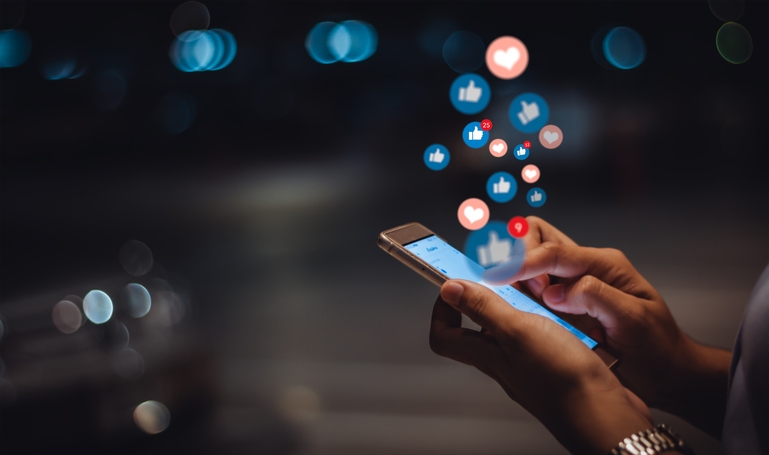
Effective event promotion is crucial for ensuring your event reaches the right audience and achieves your marketing objectives. Here are some strategies to consider:
- Start marketing early through multiple channels.
- Use targeted paid media and social media to maximize reach.
- Utilize a robust event platform that enables tracking of conversions.
- Support creative virtual marketing ideas to optimize early preparation.
By implementing these strategies, you can enhance your event’s visibility and success.
Utilize email marketing to segment lists and craft engaging content, driving registrations for your event. Social media amplifies reach through engaging content and event hashtags, enhancing event visibility. Diverse strategies such as guerrilla marketing and paid advertising can attract attention to your event.
Employing a combination of social media, email, and PPC ads creates a synergistic effect, increasing overall event awareness and engagement.
Multi-Channel Marketing Efforts
Employing a combination of social media, email, and PPC ads can create a synergistic effect, increasing overall event awareness and engagement. Recommended platforms for paid advertising in B2B event marketing include Google Ads and LinkedIn.
Utilizing digital marketing channels like email, social media, and PPC ads is essential for reaching a wider audience in B2B event marketing. Multi-channel marketing efforts ensure that your event promotion reaches potential attendees through various touchpoints, increasing the likelihood of registrations and engagement.
Leveraging these channels creates impactful events that resonate with your audience and drive business success.
Early Bird Promotions and VIP Offers
Early bird promotions in B2B events are designed to secure early registrations, forecast attendance, and create urgency. Offering a limited time for early bird tickets can effectively increase anticipation and boost initial registration rates. Early bird promotions can increase overall registration and generate buzz around the event.
VIP offers, such as exclusive access to VIP dinners or special sessions, can add value and attract high-profile attendees. These event promotions create a sense of exclusivity and enhance the overall event experience.
Leveraging early bird promotions and VIP offers drives registrations, creates anticipation, and ensures a successful event.
Post-Event Follow-Up and Analysis
Post-event follow-up is essential for nurturing leads and converting them into real business opportunities. Effective follow-up activities include sharing relevant content, expressing gratitude, and gathering feedback. Planning follow-up activities is crucial, particularly after trade shows, to nurture leads and convert them into clients.
Collecting and analyzing feedback after a B2B event is critical for understanding attendee satisfaction and identifying areas for improvement. It is essential to gather feedback to understand both successes and areas for improvement in future events. Important metrics to evaluate event success include meetings booked, opportunities generated, and potential revenue influenced.
Let’s explore sending thank-you emails and analyzing key performance indicators to enhance post-event follow-up and analysis.
Sending Thank-You Emails
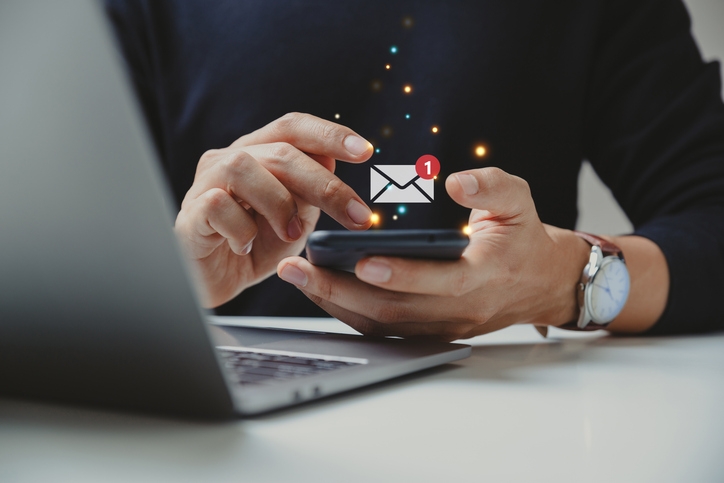
Personalized thank-you emails make attendees feel valued, enhancing their connection to your brand. Thank-you emails can share resources such as post-event resources, session recordings, presentations, and blog summaries. Timely thank-you emails sent shortly after an event can strengthen attendee connections and boost engagement.
Including targeted nurture campaigns in long-term engagement plans is essential for maintaining relationships with leads. Sending thank-you emails creates impactful events that resonate with your audience and drive meaningful interactions.
Analyzing Key Performance Indicators
Key performance indicators (KPIs) for B2B event marketing include attendance, lead quality, and ROI. Measuring event success involves collecting data from post-event surveys and analyzing attendance, lead generation, and overall engagement levels. After the event, it’s crucial to review engagement data and categorize leads as hot, warm, or cold to assess their potential.
Utilizing sophisticated CRM and marketing automation tools enhances data collection and ROI measurement for events. Analyzing KPIs improves future events and ensures alignment with business objectives.
The Future of B2B Event Marketing
The future of B2B event marketing is characterized by innovation, flexibility, and digital transformation. Virtual and hybrid formats are becoming more prevalent, providing flexibility and broader reach. AI-powered tools and cutting-edge technologies are being integrated into B2B event marketing, enhancing planning and execution.
Attendees increasingly expect interactive and personalized experiences from B2B events. It is crucial to enhance the attendee experience at all stages of the event. This approach helps in developing a meaningful community. To remain competitive, companies should leverage AI and data-driven strategies and embrace virtual and hybrid formats.
Let’s explore embracing hybrid event formats and leveraging AI and data analytics to stay ahead in the future of B2B event marketing.
Embracing Hybrid Event Formats
Hybrid events allow for broader reach and provide a personal touch, appealing to a larger audience. 46% of event marketers anticipate a growing emphasis on in-person B2B events, highlighting a shift towards hybrid models. Hybrid event models offer scalability, accommodating diverse audience sizes and preferences.
Logistical and technological challenges are common in hybrid events, necessitating careful planning. Future trends indicate that 20% of event marketers foresee a balanced approach to B2B events, integrating both in-person and virtual elements.
Embracing hybrid event formats creates impactful events that resonate with your audience and drive business success.
Leveraging AI and Data Analytics
AI and technology are crucial for enhancing B2B event marketing. Data and AI are transforming event marketing by providing insights for personalized attendee experiences and optimizing decision-making. AI provides tools such as automated scheduling, personalized recommendations, and AI-driven data analysis to enhance event marketing effectiveness.
AI-driven chatbots and virtual assistants provide real-time responses to attendees. This enhances their overall experience and streamlines communication. Predictive analytics plays a critical role in B2B events by anticipating attendee behavior and tailoring the event experience to meet their needs.
Leveraging AI and data analytics creates impactful events that resonate with your audience and drive business success.
Sustainable Event Practices
Sustainability is essential due to attendee and stakeholder emphasis on environmental responsibility. Sustainability in B2B events meets eco-conscious audience expectations and enhances the company’s image. Sustainable practices in B2B events involve reducing environmental impact and ensuring long-term growth.
Integrating sustainability into event marketing helps to build a positive brand reputation and fosters customer loyalty. Adopting eco-friendly practices creates impactful events that resonate with your audience and drive business success.
Implementing Eco-Friendly Solutions
Utilizing renewable energy sources and reducing single-use plastics are key eco-friendly strategies for B2B events. Reducing waste with digital handouts and selecting eco-friendly venues is essential for promoting sustainability in B2B events. Incorporating digital check-ins minimizes paper waste at B2B events.
Adopting these eco-friendly practices not only helps the environment but also appeals to increasingly eco-conscious audiences. Implementing eco-friendly solutions creates impactful events that resonate with your audience and drive business success.
Summary
Mastering B2B event marketing in 2025 requires a comprehensive approach that encompasses understanding the fundamentals, crafting a winning strategy, enhancing audience engagement, maximizing lead generation, effective promotion, and sustainable practices. By setting clear objectives, identifying your target audience, and choosing the right event format, you can create impactful events that resonate with your audience.
Leveraging technology, offering valuable content, and utilizing social media campaigns are essential for driving engagement and generating leads. Effective post-event follow-up and analysis ensure continuous improvement and success in future events. Embracing hybrid event formats and leveraging AI and data analytics will keep your events innovative and relevant.
Sustainability is becoming increasingly important, and adopting eco-friendly practices enhances your brand reputation and appeals to eco-conscious audiences. By implementing these strategies, you can create impactful events that drive business success and foster long-term relationships.
Frequently Asked Questions
What are the key objectives for B2B event marketing?
The key objectives for B2B event marketing are lead generation, audience engagement, and boosting brand visibility. By setting specific and measurable goals, you can ensure your event truly delivers value and meets your ambitions!
How can I identify my target audience for a B2B event?
Identifying your target audience for a B2B event starts with segmenting them by industry, role, and specific needs. Utilize pre-event surveys to uncover their interests and tailor your content to ensure maximum engagement!
What are the benefits of hybrid event formats?
Hybrid events greatly expand your reach and provide flexibility, allowing more people to participate, whether in-person or online. Embrace this format to engage a diverse audience and make a bigger impact!
How can I leverage technology to enhance audience engagement at B2B events?
Utilizing event apps, live polls, and interactive Q&As can significantly boost audience engagement at B2B events. Embrace technology to create an interactive experience that keeps your attendees informed and connected!
Why is sustainability important in B2B events?
Sustainability is crucial in B2B events because it aligns with eco-conscious audience expectations and elevates your brand's reputation. By adopting eco-friendly practices, you not only minimize environmental impact but also strengthen customer loyalty.
More Event Management

